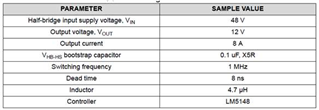Hi team,
My customer recieved the EVM and wants to know why the frequency is lower on the EVM.
100KHz~500Khz vs 1Mhz.


2nd question is what is the minimum on-time of this IC?
Thanks,
Luke
This thread has been locked.
If you have a related question, please click the "Ask a related question" button in the top right corner. The newly created question will be automatically linked to this question.
Hi team,
My customer recieved the EVM and wants to know why the frequency is lower on the EVM.
100KHz~500Khz vs 1Mhz.


2nd question is what is the minimum on-time of this IC?
Thanks,
Luke
Hey Luke,
The switching frequency of the EVM is lower due to thermals of the EVM. The device can be switched at higher switching frequencies but switching losses continue to rise with switching frequency (assuming hard switching). The device can even be switched at higher switching frequencies using the EVM if it is kept in soft switching or if thermals are managed.
For the minimum on time question I will check with our systems engineer and get back to you this coming week.
Best,
Kyle Wolf
Hi Kyle,
Thank you for your response on this.
Please check the minimum on time on this.
Also, may i know what you are refferering to? > "Hard switching" and "Soft switching". Any material that describes this would be helpful.
Thanks,
Luke
Hey Luke,
I am still waiting on response from colleague on minimum on time inquiry.
Hard switching is when the device has to use the power from the driver to turn on. This is because in order to turn on it must discharge the Coss capacitance. Soft switching is when the Coss capacitance of the device is discharged by another part of the system through normal operation. In a buck converter like the EVM, both low side and high side FETs are soft switching when there is no load connected. In a buck converter like the EVM, the high side FET begins hard switching once you connect a load and turn the load up. Because of the operation of the low side FET in a buck converter it will still be in soft switching.
Best,
Kyle Wolf